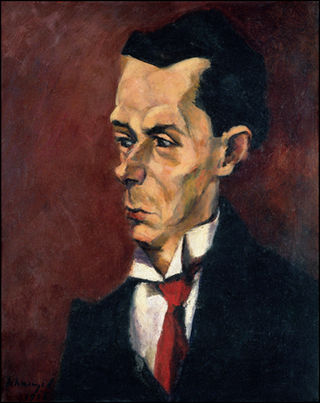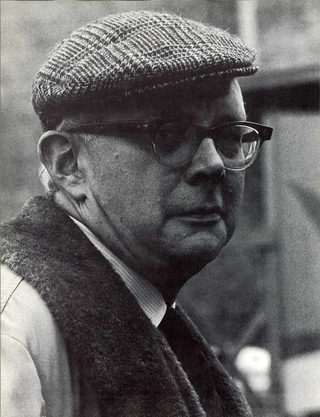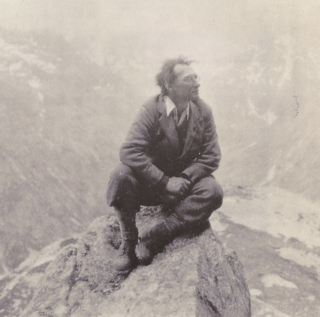Commentary or commentaries may refer to:
Philology is the study of language in oral and written historical sources; it is the intersection of textual criticism, literary criticism, history, and linguistics with strong ties to etymology. Philology is also defined as the study of literary texts as well as oral and written records, the establishment of their authenticity and their original form, and the determination of their meaning. A person who pursues this kind of study is known as a philologist. In older usage, especially British, philology is more general, covering comparative and historical linguistics.

Literary criticism is the study, a genre of arts criticism, evaluation, and interpretation of literature. Modern literary criticism is often influenced by literary theory, which is the philosophical discussion of literature's goals and methods. Though the two activities are closely related, literary critics are not always, and have not always been, theorists.

A critic is a person who communicates an assessment and an opinion of various forms of creative works such as art, literature, music, cinema, theater, fashion, architecture, and food. Critics may also take as their subject social or government policy. Critical judgments, whether derived from critical thinking or not, weigh up a range of factors, including an assessment of the extent to which the item under review achieves its purpose and its creator's intention and a knowledge of its context. They may also include a positive or negative personal response.
Criticism is the construction of a judgement about the negative or positive qualities of someone or something. Criticism can range from impromptu comments to a written detailed response. Criticism falls into several overlapping types including "theoretical, practical, impressionistic, affective, prescriptive, or descriptive".

Irving Howe was an American literary and social critic and a prominent figure of the Democratic Socialists of America.

Ivor Armstrong Richards CH, known as I. A. Richards, was an English educator, literary critic, poet, and rhetorician. His work contributed to the foundations of the New Criticism, a formalist movement in literary theory which emphasized the close reading of a literary text, especially poetry, in an effort to discover how a work of literature functions as a self-contained and self-referential æsthetic object.

Terence Francis Eagleton is an English literary theorist, critic, and public intellectual. He is currently Distinguished Professor of English Literature at Lancaster University.
Critique is a method of disciplined, systematic study of a written or oral discourse. Although critique is commonly understood as fault finding and negative judgment, it can also involve merit recognition, and in the philosophical tradition it also means a methodical practice of doubt. The contemporary sense of critique has been largely influenced by the Enlightenment critique of prejudice and authority, which championed the emancipation and autonomy from religious and political authorities.
This is an alphabetical index of articles about aesthetics.
Interpretation may refer to:

'Abd al-Rahman al-Kawakibi was a Syrian author and Pan-Arab solidarity supporter. He was one of the most prominent intellectuals of his time; however, his thoughts and writings continue to be relevant to the issues of Islamic identity and Pan-Arabism. His criticisms of the Ottoman Empire eventually led to Arabs calling for the sovereignty of the Arab Nations, setting the basis for Pan-Arab nationalism. Al-Kawakibi articulated his ideas in two influential books, Tabai al-Istibdad wa-Masari al-Isti’bad (The Nature of Despotism) and Umm Al-Qura. He died in 1902 of “mysterious” causes. His family alleged that he was poisoned by Turkish agents.
"The Frontiers of Criticism" is a lecture given by T. S. Eliot at the University of Minnesota in 1956. It was reprinted in On Poetry and Poets, a collection of Eliot's critical essays, in 1957. The essay is an attempt by Eliot to define the boundaries of literary criticism: to say what does, and what does not, constitute truly literary criticism, as opposed to, for example, a study in history based upon a work of literature. The essay is significant because it represents Eliot's response to the New Critical perspective which had taken the academic study of literature by storm during Eliot's lifetime. It also presents an analysis of some of its author's own poetic works, an unusual characteristic for modern criticism—it has become far more usual today for poets and critics to be in separate camps, rather than united in one individual. Perhaps even more importantly, it demonstrates the progress and change in Eliot's own critical thought over the years between 1919 and 1956.
J. R. R. Tolkien's bestselling fantasy novel The Lord of the Rings had an initial mixed literary reception. Despite some enthusiastic early reviews from supporters such as W. H. Auden, Iris Murdoch, and C. S. Lewis, literary hostility to Tolkien quickly became acute and continued until the start of the 21st century. From 1982, Tolkien scholars such as Tom Shippey and Verlyn Flieger began to roll back the hostility, defending Tolkien, rebutting the critics' attacks and analysing what they saw as good qualities in Tolkien's writing.
Television criticism is the act of writing or speaking about television programming to subjectively evaluate its worth, meaning, and other aspects. It is often found in newspapers, television programs, radio broadcasts, Internet and specialist periodicals and books.
Criticism of postmodernism is intellectually diverse, reflecting various critical attitudes toward postmodernity, postmodern philosophy, postmodern art, and postmodern architecture. Postmodernism is generally defined by an attitude of skepticism, irony, or rejection toward what it describes as the grand narratives and ideologies associated with modernism, especially those associated with Enlightenment rationality though postmodernism in the arts may have their own definitions. Thus, while common targets of postmodern criticism include universalist ideas of objective reality, morality, truth, human nature, reason, science, language, and social progress, critics of postmodernism often defend such concepts. It is frequently alleged that postmodern scholars promote obscurantism, are hostile to objective truth, and encourage relativism to an extent that is epistemically and ethically crippling. Criticism of more artistic post-modern movement such as post-modern art or literature may include objections to a departure from beauty, lack of coherence or comprehensibility, deviating from clear structure and the consistent use of dark and negative themes.
Historical criticism, also known as the historical-critical method or higher criticism, is a branch of criticism that investigates the origins of ancient texts in order to understand "the world behind the text". While often discussed in terms of Jewish and Christian writings from ancient times, historical criticism has also been applied to other religious and secular writings from various parts of the world and periods of history.
New historicism, a form of literary theory which aims to understand intellectual history through literature and literature through its cultural context, follows the 1950s field of history of ideas and refers to itself as a form of cultural poetics. It first developed in the 1980s, primarily through the work of the critic Stephen Greenblatt, and gained widespread influence in the 1990s. Greenblatt coined the term new historicism when he "collected a bunch of essays and then, out of a kind of desperation to get the introduction done, he wrote that the essays represented something called a 'new historicism'".

Philip Bounds was a Marxist historian, journalist and critic. He held a PhD in Politics from the University of Wales and wrote a number of books, including Orwell and Marxism and British Communism and the Politics of Literature, 1928–1939.
In literary criticism and cultural studies, postcritique is the attempt to find new forms of reading and interpretation that go beyond the methods of critique, critical theory, and ideological criticism. Such methods have been characterized as a "hermeneutics of suspicion" by Paul Ricœur and as a "paranoid" or suspicious style of reading by Eve Kosofsky Sedgwick. Proponents of postcritique argue that the interpretive practices associated with these ways of reading are now unlikely to yield useful or even interesting results. As Rita Felski and Elizabeth S. Anker put it in the introduction to Critique and Postcritique, "the intellectual or political payoff of interrogating, demystifying, and defamiliarizing is no longer quite so self-evident." A postcritical reading of a literary text might instead emphasize emotion or affect, or describe various other phenomenological or aesthetic dimensions of the reader's experience. At other times, it might focus on issues of reception, explore philosophical insights gleaned via the process of reading, pose formalist questions of the text, or seek to resolve a "sense of confusion."






